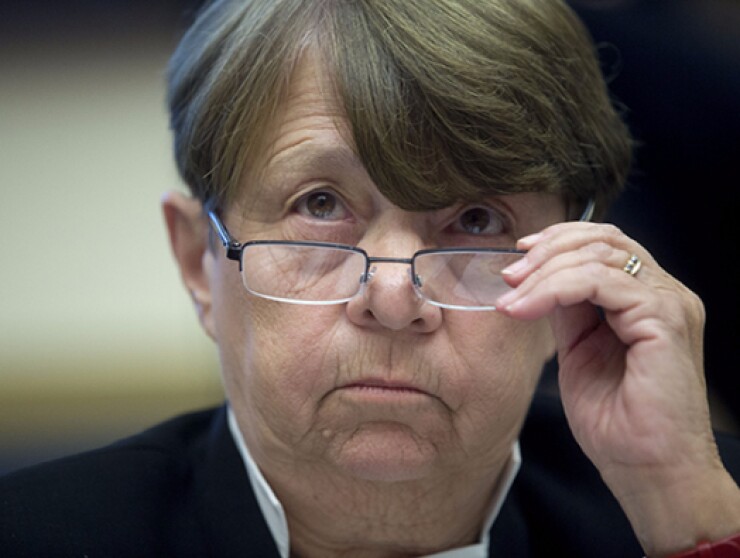Mary Jo White, the outgoing chair of the Securities and Exchange Commission, is urging accounting standard-setters to continue their efforts to converge U.S. GAAP with International Financial Reporting Standards.

White issued a
“While U.S. constituents have advised us that they do not support a move to, or an option to use, IFRS for financial reporting by U.S. companies at this time, this does not lessen the importance of their engagement on IFRS or in the broader work to further enhance globally accepted standards,” she said. “Given the increasing reliance on IFRS in the United States and around the world, focused and active efforts by the Commission and the FASB (and others in the United States), to further advance the work of the IASB on IFRS is an imperative if investors are to continue to receive clear and reliable financial information as business transactions and investor needs continue to evolve globally.”
White noted that the SEC has long promoted high-quality, globally accepted accounting standards, formally advocating them for nearly three decades. Back in 2010, the SEC reaffirmed the importance of pursuing global accounting standards. “While there has been no formal action by the Commission since, I have strongly urged engagement on this issue by the Commission, including on whether to further incorporate International Financial Reporting Standards into the U.S. financial reporting system—an issue identified for further consideration in 2010,” she said.
White became SEC commissioner in 2013 and she said that early in her tenure, she asked the SEC's Office of the Chief Accountant to review the Commission’s views on the convergence issue and do outreach to investors, preparers, auditors, standard setters and others. White announced in November that she planned to step down from her chairmanship at the end of the Obama administration. President-elect Donald Trump announced this week that he plans to nominate attorney Jay Clayton to succeed her (see
“As I approach the end of my tenure, I remain firmly convinced of the importance for U.S. investors of high-quality, globally accepted accounting standards, and I believe that the Commission must continue to pursue such standards as one of its highest priorities,” she said. “I urge the next Chair, working together with a full Commission, to speak again on this issue and agree on a path forward to most effectively advance this critical objective. It is imperative for the protection of U.S. investors and companies and the strength of our markets.”
She said the next SEC chair, working closely with the agency’s Chief Accountant, should continue to be an active member of the Monitoring Board of the IFRS Foundation. White also believes the Financial Accounting Standards Board should make full use of its membership on the International Accounting Standards Board’s Accounting Standards Advisory Forum, and the IASB should be welcoming and responsive to FASB's input.
White pointed out that U.S. investors today make many investment decisions using financial statements of foreign companies that apply IFRS issued by the IASB, investing directly in the securities of many foreign private issuers that apply IFRS in their filings with the SEC. As of September 2016, those companies alone represented a worldwide market capitalization of over $7 trillion across more than 500 companies.
“While it is now clear that U.S. GAAP and IFRS will continue to coexist in our public capital markets for the foreseeable future, it is just as clear that the efforts to enhance the respective standards and to reduce differences between them should continue,” she said. “The United States cannot afford to be myopic about this issue in light of the benefits of these efforts for all stakeholders. Strong support of both the FASB and the IASB by U.S. investors, companies, auditors, and others, including the Commission, is essential. Indeed, it should be self-evident that the pursuit of high-quality globally accepted accounting standards is part of the SEC’s continuing responsibility to encourage, facilitate and direct efforts to enhance the quality of all financial reporting that directly impacts the protection of investors and the strength of our markets. I strongly urge the next Chair and Commission to build on our past efforts and give the goal of high quality globally accepted accounting standards the focus and support this critical issue deserves.”





